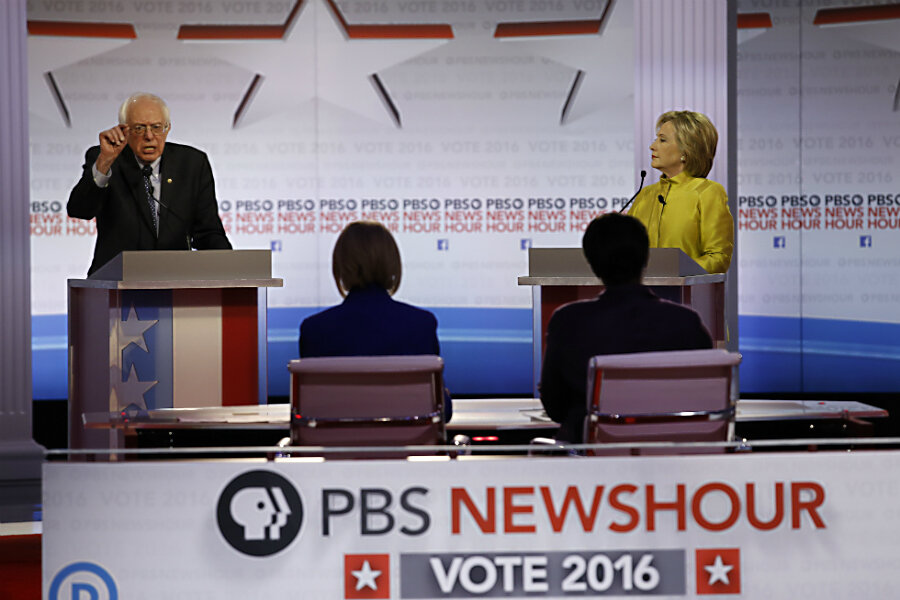Clinton vs. Sanders: Who can hug Obama tighter?
Loading...
A third, unseen figure stood on the Democratic debate stage Thursday night: President Obama.
Though wildly unpopular among Republicans, Mr. Obama remains well regarded by Democrats – particularly black Democrats. And therein lies a central paradox of the Democratic nomination race to succeed him: the need to court Obama’s supporters, and promise to protect his legacy, while also answering the public’s demand for change.
To Bernie Sanders, a self-described democratic socialist, nothing less than a “political revolution” is required. To Hillary Clinton, a more incremental change is called for, one rooted in the reality of divided government.
But at the heart of Thursday’s mostly friendly skirmish in Milwaukee lay a battle to see who could hug Obama tighter, and by extension, woo the minority voters who will be key in the coming contests, Nevada and South Carolina.
The frame was set from the opening statements.
Senator Sanders spoke about “the broken criminal justice system” and the 2.2 million Americans in prison, while “executives on Wall Street ... pay billions of dollars in settlements and get no prosecution at all.”
Former Secretary of State Clinton spoke of “African-Americans who face discrimination in the job market, education, housing, and the criminal justice system” and “hardworking immigrant families living in fear, who should be brought out of the shadows.”
The Nevada Democratic caucuses, on Feb. 20, will feature an electorate that in 2008 was 35 percent Hispanic, African-American, and Asian and Pacific Islander. In South Carolina, which holds its Democratic primary a week later, 55 percent of Democratic voters are African-American.
After Sanders’s blowout victory in (largely white) New Hampshire on Tuesday, Clinton has to halt his momentum. Sanders, who represents mostly white Vermont, has to diversify his appeal.
On Thursday night, Clinton played the Obama card early and often, dropping the president’s name 10 times before Sanders managed to do so once. She portrayed herself as the founding mother of the Affordable Care Act, referring to her effort with health-care reform as first lady in the 1990s. She praised Obama’s commission on policing, his efforts at addressing systemic racism, and his policies toward immigrant refugee children. She defended Wall Street donations to his campaigns, asserting that his signing of the Dodd-Frank regulations showed that he was not beholden to the financial industry.
And, of course, she was Obama’s secretary of State for four years – an experience that allowed her to talk circles around Sanders in the foreign policy portion of the debate.
Sanders answered Clinton’s embrace of Obama with support for the president’s executive actions on illegal immigration, though he criticized Obama’s move in the new year to deport those who have recently entered the country illegally. The deportations have been deeply unpopular in the Hispanic community, where support for Obama is less robust than among African-Americans.
Sanders also rejected Clinton’s suggestion that he was not fully supportive of Obama. She claimed that Sanders had in the past called Obama “weak” and “a disappointment,” a charge that PolitiFact called only half true.
“The kind of criticism that we've heard from Senator Sanders about our president I expect from Republicans,” Clinton said. “I do not expect from someone running for the Democratic nomination to succeed President Obama.”
“Madam Secretary, that is a low blow,” Sanders responded. “I have worked with President Obama for the last seven years. When President Obama came into office, we were losing 800,000 jobs a month.... As a result of his efforts and the efforts of Joe Biden against unprecedented – I was there in the Senate – ... Republican obstructionism, we have made enormous progress.”
Sanders also got in a dig at Clinton, pointing out that she ran against Obama for the Democratic nomination in 2008.
But there’s no doubt that for Sanders, seeking to succeed Obama by calling for a “revolution” suggests something less than a seamless transition. Obama and Sanders have had a complicated relationship over the years – in part, a reflection of Sanders’s role as an avatar of the left, and the disappointment that many on the left have felt toward Obama and the compromises he has made.
Obama has not made an endorsement. Most of the black “establishment” is backing Clinton, though some have come out for Sanders, including former NAACP president Ben Jealous.
But the impact of endorsements is questionable. The reality on the ground is that Sanders speaks to the heart, igniting enthusiasm particularly among young Democrats, while Clinton appeals to the head. Whether she can generate the kind of enthusiasm needed to put down the Sanders revolt is a big question.
Now that the Iowa and New Hampshire contests are past, many voters in the rest of the country are just getting to know Sanders, while Clinton is already a known quantity. If Thursday’s debate was their first peek at the campaign, they saw a crisp and confident Clinton up against a Sanders who seemed a bit tired.
But they also heard Sanders’s signature argument, that the campaign finance system is “corrupt” and aligned with a “rigged economy.” Since winning the New Hampshire primary, Sanders has taken in more than $6 million in small amounts, and overall, he boasts a record number of donations and donors.
Clinton, in her closing statement, took a dig at Sanders, saying, “I am not a single-issue candidate, and I do not believe we live in a single-issue country.” She also made a plea for union workers, a big element in Nevada.
But the question remains: Can Clinton use her close association with Obama to hold onto minority voters and halt Sanders’s momentum, or is the call for change just too powerful?






